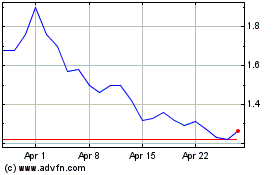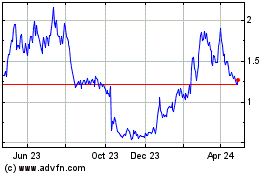By Mike Colias
General Motors Co. is raising its bet on electric cars by more
than a third, as it hustles to convince a skeptical Wall Street
that it too can be successful in the nascent market.
The nation's biggest auto maker by sales said Thursday that it
will spend $27 billion through 2025 to develop electric and
driverless vehicles. That is up from a $20 billion figure that GM
pegged in March, days before the Covid-19 pandemic forced the
industry to shut its North American factories and touched off an
industrywide cash crisis.
GM's new spending target represents more than half of its
planned capital expenditures through mid-decade, even though
electric and driverless vehicles today account for around 2% of the
company's global sales, roughly mirroring the broader market.
Electric vehicles generally have been money losers for car
companies because of their high battery costs, although GM has said
its next generation of electric cars will be profitable.
Traditional auto makers are racing for an inside edge in what
investors see as the auto sector's next big growth opportunity. The
soaring share prices of Tesla Inc., China's Nio Inc. and other
young companies with pure-electric portfolios has added to the
sense of urgency.
"We want to lead in this space," GM product-development chief
Doug Parks said during a media briefing. "Tesla's got a good jump,
and they've done great things. There's a lot of startups, and
everyone else invading the space."
But so far, GM and other legacy auto makers have been largely
ignored amid a frenzy of electric-vehicle investment.
Tesla's shares have leapt roughly sixfold this year as investors
cheer its sales growth in China and budding revenue growth from
selling connected-car services. Little-known Nio -- which in April
needed a roughly $1 billion infusion from Chinese state investors
amid mounting losses -- has seen its valuation rocket to $63
billion in recent months, just beyond that of GM.
Meanwhile, a slew of green-energy vehicle startups have had
stellar debuts after being taken public this year through
blank-check companies, including Hyliion Inc. and Fisker Inc.
GM shares have more than doubled since cratering in March during
the factory shutdowns, but its stock price, along with many other
auto companies, has lagged behind the broader market for years,
even as electric-vehicle newcomers have seen shares jump.
Analysts have lauded GM's technology and commitment to growing
its plug-in-car business. But, they say investors are more enticed
by pure-play electric vehicle companies that come without the
lower-margin, capital-intensive aspects of traditional car
companies, including vast factory footprints and unionized
workforces.
Some analysts have suggested GM spin off its electric-vehicle
business to boost the share price. Chief Executive Mary Barra has
said she is open to changes in GM's capital structure that would
reward shareholders, but won't make a move simply to get a
short-term pop in valuation.
Speaking at a Barclays investor conference Thursday, Ms. Barra
said GM has the scale in areas like manufacturing and sales to
eventually overtake Tesla as the leader in electric-vehicle sales
in North America.
"We've developed these assets and capabilities over decades.
They are real, competitive, innovative strengths that startups will
struggle to match," Ms. Barra said.
Tighter regulations on tailpipe emissions in Europe and China
also are pressuring auto makers to offer greener vehicle lineups.
The European Union's stricter rules on carbon-dioxide emissions
have many auto makers there facing the prospect of paying billions
of dollars in fines. Some states and countries have imposed future
bans on gas- and diesel-powered vehicles, including the 2035
deadline recently set by California.
Investors are paying especially close attention to auto makers'
capital-spending plans for signs of substantial bets on future
technologies that could drive growth. This week, analysts at UBS
said they favored GM shares over Ford Motor Co.'s, in part because
Ford isn't spending as much as its rival on electric-vehicle
development.
"An 'all-in' EV strategy is a prerequisite to avoid a further
de-rating of shares," UBS analyst Patrick Hummel wrote in a
research note.
A Ford spokesman pointed to past statements from chief executive
Jim Farley, who is focusing on electric versions of vehicles that
commercial customers use in their businesses, including a
battery-powered Transit cargo van Ford revealed last week. Ford has
said it is spending $11.5 billion on electric vehicles over a
five-year period ending in 2022.
"We expect demand for capable, productive and affordable
electric commercial vehicles, for example, to be massive," the
spokesman said.
Volkswagen AG, which is making among the industry's largest
investments in electric cars, this week said it would increase its
spending to about $41 billion through mid-decade, 6% higher than an
earlier target. The German auto giant said about half of its
overall capital spending during that period will go toward future
technologies, which include electric cars, more-advanced factories
and self-driving vehicles.
Electric vehicles underpin Ms. Barra's growth strategy. During
her seven-year tenure, she has pulled GM out of Europe and many
other international markets, redirecting capital toward electric
and driverless cars and other technologies.
GM said Thursday that it is working to get some electric models
to market earlier than initially planned, including a Cadillac SUV,
the Lyriq, which will hit showrooms by early 2022, nine months
ahead of schedule, Mr. Parks said.
GM said 40% of the vehicles it will sell in the U.S. by
mid-decade will be fully electric.
Write to Mike Colias at Mike.Colias@wsj.com
(END) Dow Jones Newswires
November 19, 2020 14:49 ET (19:49 GMT)
Copyright (c) 2020 Dow Jones & Company, Inc.
Hyliion (NYSE:HYLN)
Historical Stock Chart
From Sep 2024 to Oct 2024

Hyliion (NYSE:HYLN)
Historical Stock Chart
From Oct 2023 to Oct 2024
